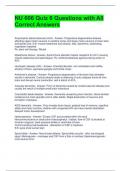NU 606 Quiz 6 Questions with All
Correct Answers
Amyotrophic lateral sclerosis (ALS) - Answer- Progressive degenerative disease
affecting upper motor neurons in cerebral cortex and lower motor neurons in brain stem
and spinal cord. S/S: muscle weakness and atrophy, falls, dysarthria, swallowing,
respiration impaired.
Rx: stem cell therapy, Rilutek
Myasthenia Gravis - Answer- Autoimmune disorder impairs receptors for AC h causing
muscle weakness and rapid fatigue. Rx: anticholinesterase agents prolong action of
ACh
Huntington disease (HD) - Answer- Inherited disorder, not manifested until midlife,
atrophy of brain, esp basal ganglia and frontal cortex
Alzheimer's disease - Answer- Progressive degeneration of the brain that ultimately
results in dementia. Cortical atrophy leads to widening of sulci, plaques found all over
brain and disrupt neural conduction, and a deficit of ACh.
Vascular dementia - Answer- Form of dementia caused by cerebrovascular disease and
usually the result of multiple small brain infarctions
Creutzfeldt-Jakob disease - Answer- Dementia caused by prion infection. Some familial
incidence but most sporadic and in older adults. Rapid destruction of neurons and
formation of plaques.
AIDS dementia - Answer- Virus invades brain tissue, gradual loss of memory, cognitive
ability and motor function; children with congenital HIV can have mental retardation,
delayed motor development
Hydrocephalus - Answer- Excess CSF accumulated within the skull.
Noncommunicative or obstructive hydrocephalus - babies, flow of CSF is blocked at
foramen magnum, back pressure builds in ventricles of brain.
Communicating hydrocephalus - absorption of CSF is impaired.
S/S: eyes show sunset sign
Spina bifida - Answer- Neural tube defects. Spina bifida occulta - mild, neurological
signs; Meningocele - meninges and CSF form a Sac on surface; Myelomeningocele -
most serious form.
, Cerebral Palsy - Answer- Group of disorders marked by some degree of motor
impairment caused by genetic mutations, abnormal fetal formation or functional brain
areas, infection or brain damage in the perinatal period.
Spastic - motor cortex (paralysis, hyperreflexia
Dyskinetic - basal nuclei (loss of motor control)
Ataxia - cerebellum (loss of balance)
Mixed - all of the above
Generalized seizures - Answer- Multiple foci in deep structures of both central
hemispheres. Absence (petit Mal) more common in children, stare off into space for 5-
10 seconds.
Tonic-clonic (grand Mal) - spontaneous start and end but have a general pattern of
events during seizure.
Rx anticonvulsant drugs, phenytoin, sedatives (phenobarbital)
Multiple sclerosis - Answer- Progressive demyelination of the neurons of the brain,
spinal cord and cranial nerve due to inflammation and formation of plaques.
S/S: blurred vision, leg weakness, numbness, tingling, fatigue
Parkinson's disease - Answer- Dysfunction of extrapyramidal motor system because of
degeneration in basal nuclei/substantia nigra. Fewer neurons secrete dopamine
(inhibitory NT) causing excess stimulation (tremors).
S/S: muscle weakness, tremors, muscle rigidity, stooped, festination (shuffling).
Rx: dopamine replacement
amyotrophic lateral sclerosis (ALS) - Answer- Progressive degenerative disease
affecting upper motor neurons in cerebral cortex and lower motor neurons in brain stem
and spinal cord. S/S: muscle weakness and atrophy, falls, dysarthria, swallowing,
respiration impaired.
Rx: stem cell therapy, Rilutek
Myasthenia Gravis - Answer- Autoimmune disorder impairs receptors for AC h causing
muscle weakness and rapid fatigue. Rx: anticholinesterase agents prolong action of
ACh
Huntington disease (HD) - Answer- Inherited disorder, not manifested until midlife,
atrophy of brain, esp basal ganglia and frontal cortex
Alzheimer's disease - Answer- Progressive degeneration of the brain that ultimately
results in dementia. Cortical atrophy leads to widening of sulci, plaques found all over
brain and disrupt neural conduction, and a deficit of ACh.
Schizophrenia - Answer- Reduced gray matter in the temporal lobes, abnormal cells in
hippocampus and excessive dopamine secretion. S/S: disorganized thought processes,
delusions, flat emotions, decreased speech, mood swings. Rx: antipsychotics,




